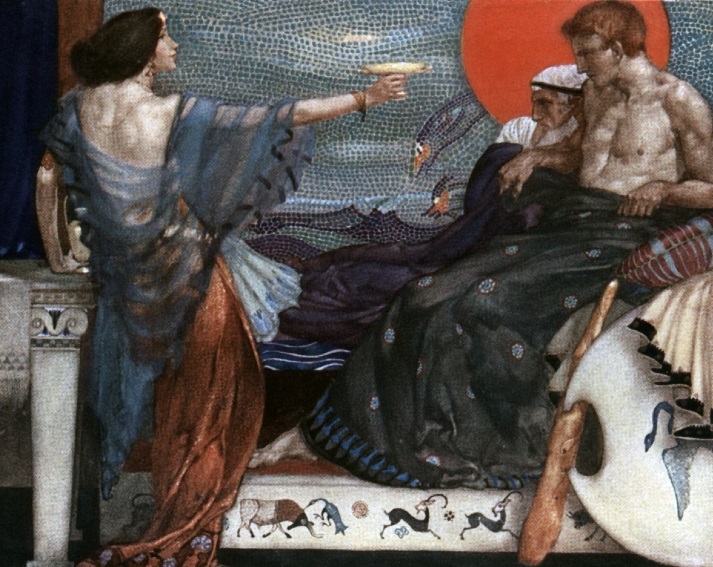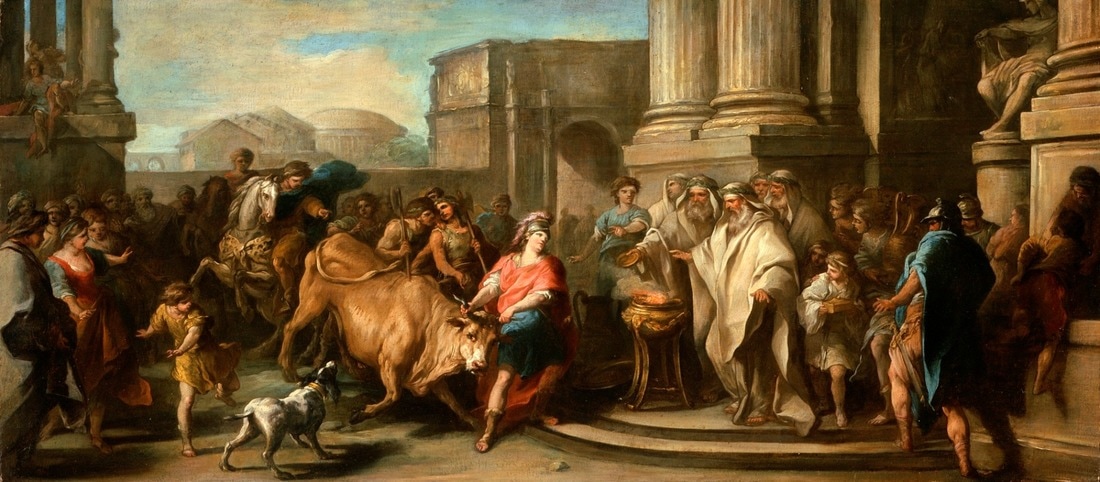Androgeus
Androgeus (Ancient Greek: Ἀνδρόγεως, derived from andros "of a man" and geos, genitive gē "earth, land") was a prince of Crete in Greek mythology, and his death ultimately led to a war between Athens and Crete.
Androgeus (son of Minos)
Androgeus was considered to be the favourite son of King Minos of Crete, born to his wife Pasiphae, making Androgeus brother to Ariadne and Deucalion amongst others.
Androgeus grew up to be both athletic and scholarly, and this would see him become a competitor at the first Panathenaic Games, games that involved both athletic events as well as cultural events.
THE DEATH OF ANDROGEUS
It was the prowess of Androgeus during the Panathenaic Games that caused the death of the son of Minos.
Some tell of how the other competitors, jealous of the ability of the Cretan, simply murdered him whilst in Athens. Others tell of how the murderers of Androgeus were employed by Aegeus, for King Aegeus was afraid that Androgeus was plotting with Pallas and his sons, the Pallantidai, to overthrow him.
Alternatively, King Aegeus, acknowledging the skill of Androgeus, decided that the young man was the one to rid Marathon of the Marathonian Bull that was ravaging though the country. Androgeus might have been more than capable as an athlete but the Marathonian Bull proved deadly for the Cretan prince, goring Androgeus to death.
THE CAUSE OF WAR
Whether Androgeus was murdered, or killed by the Marathonian Bull, did not matter to Minos for the King of Crete placed the blame solely at the door of Athens; and so Minos sent his powerful navy and army against Athens.
Megara would fall before the Cretan army, and when at the gates of Athens, Minos called down a pestilence upon Athens. The military force of Athens was no match for Crete’s, and so after consulting an Oracle it was decided that Athens would have to pay a tribute to Crete.
The tribute would take the form of seven youths and seven maidens paid every year, or every seven or nine years, and these young Athenians would be sacrificed to the Minotaur on Crete. The tribute would continue to be paid until Theseus, Aegeus’ son arrived on Crete.
ALSO
Some tell of Androgeus being the father of Sthenelus and Alcaeus, who when of age became companions of the hero Heracles. Sthenelus and Alcaeus would accompany Heracles against the Amazons, and would later be made co-rulers of Thasos later, although others say that Sthenelus and Alcaues were sons of Actor, not Androgeus.
Androgeus (Aeneid)
In Virgil's Aeneid, Androgeos or Androgeus was a Greek soldier, who during the sack of Troy in the middle of the night mistook Aeneas and his group of Trojan defenders for a Greek raiding party, paying for this mistake with his life.
Afterwards, Aeneas's companion Coroebus dressed in Androgeos's armor in order to fool more Greek soldiers to their demise, only to be the first among Aeneas's disguised group to die.

Sources
Pseudo-Apollodorus, Bibliotheca 3.15.7
Pseudo-Apollodorus, Bibliotheca 2.5.9
Servius, Commentary on Virgil's Aeneid 6.14
Plutarch, Theseus 15.1
Pausanias, Graeciae Descriptio 1.27.10
Diodorus Siculus, Bibliotheca historica 4.60.4
Hyginus, Fabulae 41
Pausanias, Graeciae Descriptio 1.1.4
Pseudo-Apollodorus, Bibliotheca, 3.15.7-8
Propertius, Elegies 2.1.64
Hesychius s.v. ε 4499 says that this Androgeos was also called Eurygyes.
Diodorus Siculus, Bibliotheca Historica. Vol 1-2. Immanel Bekker. Ludwig Dindorf. Friedrich Vogel. in aedibus B. G. Teubneri. Leipzig. 1888-1890.
Gaius Julius Hyginus, Fabulae from The Myths of Hyginus translated and edited by Mary Grant. University of Kansas Publications in Humanistic Studies.
Pausanias, Graeciae Descriptio. 3 vols. Leipzig, Teubner. 1903.
Pseudo-Apollodorus, The Library with an English Translation by Sir James George Frazer, F.B.A., F.R.S. in 2 Volumes, Cambridge, MA, Harvard University Press; London, William Heinemann Ltd. 1921.
"Greek Legends and Myths"













